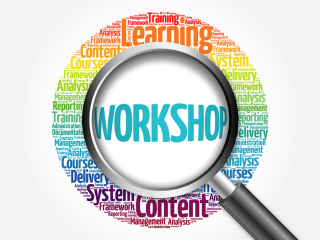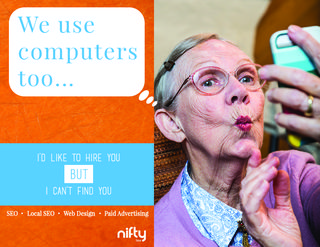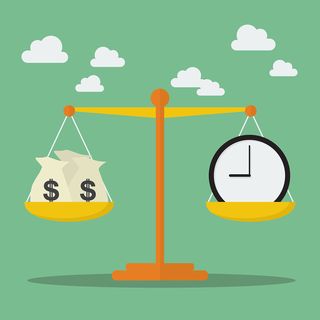When LWP members start putting their workshops together for the first time, they often think of them as a way to generate new clients, which is a key outcome. However, they tend to focus on the workshop solely as a lead generator, and this mindset falls severely short in terms of what workshops actually help you accomplish. The workshop should be considered part of your process, the education part. It is the part of the process that almost everyone needs, but they don’t think they do. The workshop helps participants see things they didn’t know, as well as things they didn’t even know they didn’t know; it provides them something new upon which to reflect. The workshop doesn’t just generate leads; it helps enroll qualified candidates into your firm for a Vision Meeting and helps you accomplish higher retention rates and higher average fees, adding to increased profitability. This article gives an overview of seven common workshop mistakes that will sabotage your success.
What Is A Successful Workshop? Here’s All You Need to Know…
I've been working with estate planning attorneys around the United States for almost 20 years, and I am always intrigued about how excited they get when they deliver a presentation, seminar or workshop. The interesting dynamic is how pumped they get in front of a room full of people. It might surprise you to learn that such a situation is not exciting to me or to any LWP attorney, for one simple reason. We have learned that it is not the number of people in the room or your ability to speak to them that matters, but rather your ability to communicate and create relationships with them so they trust you and understand how you can help them accomplish their goals. That’s when they hire you.
 Under the Lawyers with Purpose workshop system, our members are provided three different workshops, depending upon which best matches their personal objectives. We offer members the “Estate Planning Essentials” workshop, the “Seven Threats to Every Estate Plan” workshop, and the “How to Protect Your Stuff in Three Easy Steps” workshop. All three teach the same concepts and utilize similar stories, but most importantly, all connect and relate to the Estate Plan Audit™ utilized in the Vision Meeting™ with individuals who attend the workshop and opt for a meeting with you. They also delve into what estate planning is and the specific issues you want them to know (all contained in our trademarked and copyrighted workshops).
Under the Lawyers with Purpose workshop system, our members are provided three different workshops, depending upon which best matches their personal objectives. We offer members the “Estate Planning Essentials” workshop, the “Seven Threats to Every Estate Plan” workshop, and the “How to Protect Your Stuff in Three Easy Steps” workshop. All three teach the same concepts and utilize similar stories, but most importantly, all connect and relate to the Estate Plan Audit™ utilized in the Vision Meeting™ with individuals who attend the workshop and opt for a meeting with you. They also delve into what estate planning is and the specific issues you want them to know (all contained in our trademarked and copyrighted workshops).
Why is this relevant? Because the excitement over the number of people in your workshop is baseless if none of them hire you. If your workshop can't show people how you can help them and explain how your solutions are relevant to them and will benefit them, then stay home with your family rather than waste the time.
So, to avoid that scenario, let’s consider the core elements of a successful workshop. First, ensure in advance that you are clear on who is registered to attend your workshop. You should also ask how each attendee heard about you; that is, what source of marketing got them to call your office (a professional relationship, a retail advertisement, or other). Second, your staff should welcome all attendees during enrollment, excite them about the workshop they're going to attend and touch on how it will offer new ideas to solve their concerns. Third, your team should follow up with attendees ahead of time and confirm attendance. Fourth, during the workshop it is essential to set the expectation up front that you will make commitments to the audience, and to make sure the audience understands that you expect them at the end of the workshop to complete the evaluation and request a meeting if they think it's appropriate. This is perhaps the most important part of the workshop – not all the education you provide, but rather the invitation for them to move forward with you at the conclusion. You must be enthusiastic and excited for them to come in and apply what they learned to their personal situation, in hopes of helping them accomplish their goals and objectives based upon what they’ve learned in the workshop. If you don't believe in yourself, why would they?
And finally, another very important element of every workshop, one in which I have found that most lawyers fail, is to follow up with the attendees to schedule the appointment. I cannot tell you how many times I've worked with attorneys who either neglected to get an evaluation at the end or got the evaluation and failed to follow up on it.
Life is busy. People don't have “free time” to just pop into a workshop, and oh, by the way, I can't wait to go see a lawyer tomorrow to talk about all this crazy stuff. For most people, their lives are busy and complicated, and they're confused. You must be the one who clarifies the confusion and shows them a simple approach for them to get their concerns solved.
That's what the Lawyers with Purpose workshop system does. In fact, we call it the Client Enrollment System™ because it's a complete process, from identifying the client's needs after their initial contact with you, to the point of their engagement with your firm. That's the significance of workshops and seminars: not the excitement of delivering them, but the excitement of actually being able to help people implement great planning solutions that protect them and their family. Contact Lawyers with Purpose today if you want to learn more about what we can bring to your estate and/or elder law practice. Just click here and give us a little information then download our membership brochure.
David J. Zumpano, Esq, CPA, Co-founder Lawyers With Purpose, Founder and Senior Partner of Estate Planning Law Center
Sales Lessons from Italy
When I was in high school, I took Latin for two years as my foreign language elective. “What a waste,” I thought, until a few weeks ago, when I took my family to Italy. The trip was actually a business trip to brainstorm with colleagues in Florence. Time away from my office to work on my business with extremely intelligent, successful lawyers is always beneficial. But I had no idea how much I would learn about business and sales just by walking the streets. Based on the questions my children asked, they too learned valuable lessons.
First, the canals in Venice were lined shop after shop with uniquely blown glass of jewelry, animals, tableware, and anything else imaginable. On each Florence corner, and between each corner, were gelato (ice cream) stores. The plazas in Rome were bordered by restaurants, shoulder to shoulder, each with virtually identical menus. Nothing stood out. How did any of them get business? Why were some packed while others were bare?
 On our last night in Italy, we wanted a place to eat that was close and easy. We had already eaten 18 meals of pasta and had at least 12 gelato treats. We stopped at the first restaurant on the corner of the big plaza near our hotel to review its posted menu. An employee, specifically stationed in the street in front of the outdoor seating, walked over to us and immediately began to share that they have only the freshest ingredients and no microwave or freezer on the premises. He understood that his menu was like everyone else’s, but he focused on how their food was better. He then got personal and asked my son, “What would you want to eat if you were here? … We can do that.” Naturally my son was sold. After sitting down, I began listening and watching our salesman and noticed the following:
On our last night in Italy, we wanted a place to eat that was close and easy. We had already eaten 18 meals of pasta and had at least 12 gelato treats. We stopped at the first restaurant on the corner of the big plaza near our hotel to review its posted menu. An employee, specifically stationed in the street in front of the outdoor seating, walked over to us and immediately began to share that they have only the freshest ingredients and no microwave or freezer on the premises. He understood that his menu was like everyone else’s, but he focused on how their food was better. He then got personal and asked my son, “What would you want to eat if you were here? … We can do that.” Naturally my son was sold. After sitting down, I began listening and watching our salesman and noticed the following:
- He started with something small – “Would you like to sit and have a special drink” – without presuming a person was hungry for a full meal.
- He walked toward the table and said, “Table for four right here for you,” confidently, as if the sale had already been made.
- When asked by another prospective customer, “What is the best place after yours?” he replied, “You are already here, why would you want to keep walking only to find the second-best place?”
- They filled the tables closest to the walkway first, then behind, to provide social proof of those walking by that the restaurant was desirable.
Since gelato is an impulse buy or a “treat,” the menu was not as important. But since there was a gelato stand on just about every corner, I looked for what made one more attractive than another. For starters, the shops where you could see the gelato from the street through windows were eye-catchers, versus having to go into the shop. Second, a clearly visible sign that said gelato and pictures of gelato were helpful. Shops that only sold gelato and not other items (sandwiches, water, souvenirs) attracted more business. Thus, the takeaway points were:
- Be visible and use visuals;
- Specialize and don’t confuse the market by selling too many products.
Not all sales strategies I observed were effective. In fact, some were quite offensive. First, after we climbed next to the Spanish steps (the actual steps were under construction), a rose peddler approached and I said, “No, thank you,” then, “No, grazie.” He persisted and said, “It is a gift for you to give to Saint Mary (in the church at the top of the steps).” He handed me three roses as a “gift.” I turned away and he then pulled my arm and held out his hand for money. I reluctantly put in two Euros and he asked for more based on the value of three roses. Jennifer was not as considerate as I was: She took two roses from my hand, thrust them back at the guy and said, “Take your roses and leave us alone.” There was no way I was getting the third rose out of my daughter’s hands.
Similarly, while walking through a plaza toward a merry-go-round, a balloon artist handed my daughter a balloon and said, “This is for you.” Naturally, Katherine took it, said, “Thank you,” smiled real big, and began skipping. The balloonist looked to Jennifer for the money (who had none). Jennifer had to take the balloon out of Katherine’s hands, to a crumbling face, and ask her, “Do you want the balloon or the merry-go-round?” A good lesson for Katherine about choices and priority, but an ill-attempted sales strategy by the balloonist.
Two other lessons we picked up based on questions or observations from my son. First, in all three cities we visited, we saw panhandlers, many of whom presented as homeless. Then, on the plazas we enjoyed individuals showing off their talents (juggling, singing, magic, etc.) to earn money thrown into a pan or hat. Christopher asked, “Do only homeless people do tricks for money?” I replied, “No, honey, only the hungry.” That is a generalization, of course. The meaning behind my response was, “Those willing to put themselves out there to earn a living for their needs will do what it takes to earn money.” Satisfied with that response, when we stumbled upon the Roma Gay Pride celebration near the Colosseum, both children were dancing and really enjoying themselves. Christopher said without any hesitation, “Mommy, can I have a can so people can put money into it for our dancing?” I laughed and told him no, but the real lesson was that he was willing to unabashedly “entertain” and make money while I, on the other hand, was too embarrassed to let him. How many people engage in marketing strategies that work very well, but that you refuse to do based on your own limiting beliefs or pride?
The second lesson my son pointed out was at the Trevi Fountain. The legend is that if you throw a coin in the fountain, then you will return to Rome. My son aptly pointed out, “That is just a trick to get you to give them money.” True. Nonetheless, how many people throw the coin? It’s not about throwing the coin or not, it’s about the experience of throwing the coin. How can you be a fountain to your clients, where they are willing to throw coins just for the ongoing relationship or experience (e.g. maintenance plan)?
When you are out of your office, pay attention to the sales strategies of other businesses. If you were in Rome, would you do as the Romans do? Can you incorporate any of the lessons in your own office?
Victoria L. Collier, Co-Founder, Lawyers with Purpose, LLC, www.LawyersWithPurpose.com; Certified Elder Law Attorney through the National Elder Law Foundation; Fellow of the National Academy of Elder Law Attorneys; Founder and Managing Attorney of The Elder & Disability Law Firm of Victoria L. Collier, PC, www.ElderLawGeorgia.com; Co-Founder of Veterans Advocates Group of America; Entrepreneur; Author; and nationally renowned Presenter.
World Elder Abuse Awareness Day
World Elder Abuse Awareness Day is certainly one we all wish did not require special attention on our calendars. Unfortunately, it does. Every year an estimated 5 million older Americans are victims of elder abuse, neglect, or exploitation. And that’s only part of the picture: Experts believe that for every case of elder abuse or neglect reported, as many as 23 cases go unreported. Elder abuse can take many forms: verbal, physical, financial. Today is the day we as advocates for the elderly can take a moment to remember a few steps we can take for our clients to discover and stop elder abuse.
 First, we must listen to our clients. Clients are often brought into our office by their children or another family member. As part of our ethical practice, we should always take an opportunity to speak to our elderly clients alone, explain to them the confidential nature of our attorney-client relationship and allow them the opportunity to tell us any information they may not be comfortable disclosing in front of the person who brought them into the office. Affording our elderly clients the opportunity to confidentially trust in us can often bring feelings and issues to the table that could otherwise go unnoticed.
First, we must listen to our clients. Clients are often brought into our office by their children or another family member. As part of our ethical practice, we should always take an opportunity to speak to our elderly clients alone, explain to them the confidential nature of our attorney-client relationship and allow them the opportunity to tell us any information they may not be comfortable disclosing in front of the person who brought them into the office. Affording our elderly clients the opportunity to confidentially trust in us can often bring feelings and issues to the table that could otherwise go unnoticed.
Second, we can recommend that caregivers find the necessary time to take care of themselves. Caregivers are full-time nurses, cooks, housekeepers, and sitters. Statistics show that a large percentage of elder physical abuse takes place because of caregivers feeling overwhelmed. We can gather information about caregiver support groups in our area and provide that list to the caregivers entering our office. Providing information and understanding to caregivers allows them to know that our offices are there for them when they reach a point where they feel they cannot continue on.
Third, we can monitor the trusts created for our clients as Trust Protectors. This is a wonderful way to use the LWP maintenance plans to benefit the clients we love. As Trust Protector we can assure that the assets our clients worked so hard for are being used as they intended and in a fashion that represents their best interests. When a trustee is abusing his or her authority, we can step in and protect the assets our clients have entrusted us to protect.
Finally, we can educate our communities. We can reach out to community groups and organizations and speak to them about the signs of elder abuse, the importance of caregivers’ own health and well-being, the standards Attorneys-in-fact and Trustees are held to, and what signs to look for in our loved ones who are being cared for outside of the home. We can arm clients and community members with the names of their local ombudsman and elder abuse agencies.
So today, I hope each of us takes the opportunity to think of one thing we can do to stop elder abuse. Wouldn’t it be nice if this was a day we never have to “celebrate” again?
If you want to learn more about becoming a Lawyers With Purpose member, click here and give us a little information about yourself. You will then be able to download the Membership Brochure.
Kimberly Brannon, Esq., Software and Legal-Technical Trainer – Lawyers With Purpose
Members! Join Our Marketing Roundtable On Local Search With Nifty Law!
 It’s not easy for a person to find the right lawyer, in the right town. With today’s clients turning straight to the Internet to find that one unique lawyer in their local area, marketing your practice can feel like trying to break the Enigma Code.
It’s not easy for a person to find the right lawyer, in the right town. With today’s clients turning straight to the Internet to find that one unique lawyer in their local area, marketing your practice can feel like trying to break the Enigma Code.
Join us on Thursday, June 9th at 4 EST along with Mike Ramsey of Nifty Law to learn the nuts and bolts expert tips about directory listing, search engine dos and don'ts, paid online advertising – getting links, likes and shares.
For anyone looking to unlock the mysteries and getting found on the Internet.
This is a members only event.
Register today: https://attendee.gotowebinar.com/register/1139857481701604100
Dig, if you WILL … the truth about Prince’s estate
Doves do not cry. Crying as an expression of pain or emotion is a mammalian trait. I know this to be true because on a 6th grade trip to the zoo, dressed in my finest purple, I asked the zoologist. So I am confident in stating that if you owned a raspberry beret and spent any portion of 1986 walking into the grocery store through the out door, you understand the depths of my mourning for the death of Prince.
As a closet follower of all things pop culture, I have listened repeatedly to my Prince playlist and read every article I have run across about Prince since his death. And then, today, it happened. I read an article so blatantly ridiculous, it could not possibly be true. Who would write such an atrocious, fabricated tale, and who would believe it? Turns out the top celebrity magazine in the country wrote it, and based on the 396 comments I saw, everyone believed it. The article has since been edited. Experts in the area have been interviewed and the magazine has fixed its egregious errors. Most likely these errors were discovered when their own attorneys almost fell out of their chairs, as I did. So, I promise that I will not trouble you with the hideous nature of the original article or the depression that sank further into my soul as I browsed reader comments saying they were going to contact their police stations on the subject. I will simply tell you the title of the article, which will provide you with all of the outrage and confusion you need for the day.
Who Will Get Prince’s Millions? Cops Say They Have No Record of a Will for the Late Singer.
 Just let that sink in. As promised I will not regale you with the quotes from the original article saying that if no will is filed soon, the property of the singer who died a few days ago may be divided equally between his siblings. I will not bore you with the notion that the word TRUST was in the original article zero times. I will not tell you how the original article relied on police officers for all quotes related to probate administration. (Of course, they did not use that phrase.)
Just let that sink in. As promised I will not regale you with the quotes from the original article saying that if no will is filed soon, the property of the singer who died a few days ago may be divided equally between his siblings. I will not bore you with the notion that the word TRUST was in the original article zero times. I will not tell you how the original article relied on police officers for all quotes related to probate administration. (Of course, they did not use that phrase.)
I will simply say this: We have no idea what will happen with Prince's estate. However, this article and hundreds of others like it do send a clear message that people are being miseducated and misinformed about estate planning and administration by the media.
As elder care attorneys, we need to take seriously this article and the hundreds of comments from readers believing everything they read. Our baby boomers are reaching the age of health issues, and every family is one accident away from a crisis situation. It is our duty to continue to educate our communities through workshops on the truths about wills, trusts and administration. Understanding the importance of protecting their assets for themselves and their children is a duty LWP attorneys have to our communities, and I am proud that we do not take that lightly.
And, if you are an elder care attorney, I encourage you continue the workshops you provide to your community giving the tools and knowledge necessary to help make educated decisions about family affairs. And, providing options to attendees will potentially save thousands of dollars when crisis strikes or old age rears its ugly head.
Let us, as the LWP community working together with our clients, not give up on our goal of educating and providing the best legal advice out there for families. Let us not give up – until the doves cry.
Early Bird registration and pricing is now open for the June 20th – 24th Tri-Annual Practice Enhancement Retreat in San Diego. During the week you'll discover our most effective and PROVEN practice growth strategies, legal/technical best practices and marketing GOLD – so powerful and cutting edge we will ONLY share them face-to-face! Register today and reserve your seat at early bird pricing!
Kimberly M. Brannon, Esq., Legal-Technical and Software Trainer
10 Ideas to Make Your Law Firm Website Better Today
Today we welcome Guest Blogger Mike Ramsey, President of NiftyLaw. He writes and speaks across the nation about all things search, social, and local.
__________________________________________________________________________________________________________________________________
 Most law firms have active websites, but not many of them are good. This gives you a fantastic opportunity to improve your website and stand out from the crowd. After all, a professional website can create the much-needed positive impression, strengthen credibility, and generate new business for you.
Most law firms have active websites, but not many of them are good. This gives you a fantastic opportunity to improve your website and stand out from the crowd. After all, a professional website can create the much-needed positive impression, strengthen credibility, and generate new business for you.
In this post, I’m going to share 10 ideas to make your law firm website better today.
Let’s get started…
1. Use Images of Attorneys and Your Office
A professional law firm website needs to build trust, authenticity, and credibility. And nothing does that better than images of your own office and attorneys.
Here is an example.
You can always use stock images on your website, but that’s not recommended. It looks generic, and stock images can never reflect the personality and values of your business — which are important factors.
Pro Tip: Use PhotoFeeler to get unbiased feedback on your photos and control the impression it sends to your potential clients.
2. Start Publishing Blog Posts Regularly
Blogging plays a significant role in lead generation — especially for law firms. According to studies, marketers who blogs generate 67% more leads than those who don’t. Also, businesses with over 200 blog posts generate 5x more leads than those with 10 or fewer.
So, as you can see, blogging is a great long-term investment.
Furthermore, your entire content marketing efforts will be based on your business blog. Let’s discuss it more.
3. Target the “Right” Audience
Here is another tip about blogging.
When you are creating content, it is important to identify the type of audience you are targeting. You are not creating content for other lawyers. It’s a rookie mistake that actually a lot of law firms make.
You should be creating content for your potential customers. Other lawyers are not your potential clients in many cases and there are better ways to create relationships with lawyers in person compared to blogs.
So choose your topics wisely.
4. Local Area Keyword Targeting
Okay, this is the last tip on blogging and content marketing. I promise.
When you are creating content for your law firm website, make sure that you are targeting the right keywords.
One tip is to target keywords for all the local places where you provide services. For instance, if you are a lawyer in Chicago, you probably work with people in the entire metro and should be targeting multiple local areas, e.g., Cicero estate planning, Evanston elder law, Oak Park, Skokie, etc.
Create content to publish on your website with these areas as primary keywords. Optimizing these location keywords will help you get more search engine traffic and potential leads from those geographical regions. This will also expand your website dramatically.
You can use the Google Keyword Planner to find all the relevant keywords and keyword phrases.
5. Responsive Mobile-Friendly Design
Mobile searches have become an important component of online marketing. If your website isn’t mobile-friendly, it can have several negative impacts on your online business.
First of all, nearly 50% of the website traffic comes from mobile devices. If your website isn’t compatible, you are simply going to lose all that traffic. Secondly, search engines prefer mobile-friendly websites.
In April 2015, Google announced their mobile-friendly search engine algorithm update. According to this update, if you are website isn’t mobile-friendly, Google may not rank it higher in the search engine results pages (SERPs). Following that, Bing has also announced their own mobile-friendly algorithm.
6. Building an Email List
An email list of targeted subscribers and potential leads is, by far, the most valuable asset of your online business. It’s important that you start building an email list right from the start.
Why is an email list so important for a law firm website?
It’s simple.
Approximately only 4% website visitors are ready to buy right away when they visit your website. The rest of the 96% need to be properly nurtured. And there is no better way to nurture potential leads than email marketing.
Moreover, when you stay in touch with your email subscribers and send them useful information, they are more likely to hire your services and trust your recommendations.
7. The Psychology of Color
Sometimes, just choosing the right color for your website can make a huge difference. It’s important because each color sends a different message and that can change the perception of your website visitors.
For instance, blue is a color that builds trust, credibility, order, loyalty, and authenticity. This is the reason so many financial institutions and banks use blue.
You can leverage this information and use this to your own advantage and ensure the color choices of your firm are in line with the messaging you want to send.
8. Focus on Reputation
Your website can create a great first impression that you need so much.
For instance, take a look at the following image.
The website specifically focuses on building the good reputation. It shows achievements, highlights different accomplishments, and has a great tagline to go with it.
You should also use testimonials of satisfied customers to complement other elements on your website. A great tool to help generate feedback from customers is GetFiveStars where you can manage reviews, ask for testimonials, and address issues before they become reputation problems.
9. Stand Out with Video Marketing
Video marketing can have great rewards if done properly.
The idea is to rise above your competitors by having engaging videos on your law firm website.
You can create testimonials videos, educational videos, or promotional videos. And when all else fails, you can just be “memorable”.
10. Contact Information
One of the major reasons why people visit your law firm website is to find your contact information. It is, therefore, your job to make it as easy for them as possible.
Don’t forget to mention the physical address of your firm, your local phone numbers, an active email address, and a map. It is important that the contact information — Business name, address, and phone number are consistent everywhere on the web.
Also, depending on your website design, it is a good idea to display the contact information on every webpage. You can easily achieve that by displaying the contact information in the header or the footer of your website.
It can also be a good idea to clarify that an email or contact form submission does not initiate an attorney-client relationship — as shown in the following image.
Final Words
It is important to understand that your law firm website is a crucial component. Without it, you won’t be able to manage content marketing. 81% people search online before buying, and that makes it imperative that you have a great law firm website in place. And you can use these 10 ideas to make your law firm website better today.
Mike Ramsey, President of NiftyLaw
Mike is one of our sponsors for the February Tri-Annual Practice Enhancement Retreat…. and he's also a guest speaker! Join the conversation during his focus session on the Thursday, 2/25 Marketing Track at 8AM : "I'd Like to Hire You, But I Can't Find You" and learn all things local search to dominate online in your area!
If you're not a Lawyers With Purpose member and want to know more about our Cloud Based Workflow System, join our webinar on Thursday, February 26th at 2EST – Click here to register for our Live Law Firm CRM Workflow System Demo for estate planning and elder law attorneys.
Roslyn Drotar – Lawyers With Purpose, Online Marketing Strategist
Do You Hold Your Client’s Hand Through The Planning Process…
I was walking to the park with my daughter when she asked me to hold her hand. There is no feeling like my child’s hand in my own. But I was confused when, as we were holding hands, my daughter said, “No, Mommy, hold my hand.” I thought I was. I was not. Rather, I was letting her hold my hand. My fingers were still outstretched and not wrapped around her hand. She wanted the security of my hand holding her tightly.
In our law firms, how often do we believe we are holding our client’s hand when actually we are not? We feel we are providing a top-notch service but we are not. Are we holding their hand or really just letting them hold ours?
 Becoming eligible for and applying for veterans benefits is complicated. The client must be instructed step-by-step through the process. The same is true for Medicaid applicants. From the time the client engages our services through the receipt of a benefits award, we are regularly communicating and giving instruction. I know we have stopped holding their hand when the client calls and says, “Why isn’t this going faster?” or “I’ve paid all this money and I don’t think we’ve gotten our money’s worth,” or “It just doesn’t feel worth this trouble,” or “I wish I had not even hired you.”
Becoming eligible for and applying for veterans benefits is complicated. The client must be instructed step-by-step through the process. The same is true for Medicaid applicants. From the time the client engages our services through the receipt of a benefits award, we are regularly communicating and giving instruction. I know we have stopped holding their hand when the client calls and says, “Why isn’t this going faster?” or “I’ve paid all this money and I don’t think we’ve gotten our money’s worth,” or “It just doesn’t feel worth this trouble,” or “I wish I had not even hired you.”
Those are not words you want to hear from a client. They are often followed by words that sound like “refund.” It is easy to get defensive and blame the system or the VA. But what is really happening? We have stopped holding our client’s hand and just let them hold ours. We have stopped providing them the security they need to feel safe and confident in us.
Perhaps not everyone on the team even knows they are supposed to hold your client’s hand. My marketing director was speaking with a nursing home administrator during a synergy meeting. The nursing home administrator asked, “Do you hold your client’s hand through the process?” My marketing director said, “Oh, no, we don’t hold their hands.” When I heard that, I was confounded. How could he say such a thing when we work so hard to please our clients? His definition and my definition of holding hands was different. Just like when I was holding my daughter’s hand, her definition was different from mine. Her expectation was different from mine.
I encourage you to review your office procedures and processes. Are you providing to your client the sense of security you believe you are providing? Are you meeting the expectations you have given your clients? Where can you more securely hold their hand? Just a slight adjustment will make a huge difference to them. Now, when I hold my daughter’s hand, I pay close attention to ensure that my fingers wrap around her hand, as she wants, expects and needs.
If you would like a free eBook and discover the secret smart estate and elder law attorneys use to run their practice and generate success by design rather than default click here to download "The Five Essential Roles For A Successful Practice".
Victoria L. Collier, Co-Founder, Lawyers with Purpose, LLC, Certified Elder Law Attorney through the National Elder Law Foundation; Fellow of the National Academy of Elder Law Attorneys; Founder and Managing Attorney of The Elder & Disability Law Firm of Victoria L. Collier, PC, www.ElderLawGeorgia.com; Co-Founder of Veterans Advocates Group of America; Entrepreneur; Author; and nationally renowned Presenter.
I Never Expected This
Recently I finished my first book, “Protect Your IRA: Avoid the Five Common Mistakes.” It was a project I've attempted to do for years, but quite honestly I wasn't prepared for the strategic by-products that came from it. Most interesting was the impact it had on those closest to me – my family – who don't know the details of what I do. They were intrigued by how the book took very complex information and made it simple to understand. After reading it they said, “Wow, I didn't know you dealt with all that stuff.”
 The other surprise was how it landed on the professionals I work with. After reading the introduction and closing, they felt as if they were part of the book with me because of the commitment in the book to having professional alliances to help clients attain their goals. Coworkers were also intrigued, and pointed out that as many times as they've heard me say the things that were in the book, they never understood it as a whole, organized in the fashion it was, with such poignant points for clients to understand. In fact, they even suggested it will make them more competent in talking to clients on this very complicated issue of IRAs. Finally, the client’s response after reading it was, “Do I need to get in and get a checkup? Am I all set?”
The other surprise was how it landed on the professionals I work with. After reading the introduction and closing, they felt as if they were part of the book with me because of the commitment in the book to having professional alliances to help clients attain their goals. Coworkers were also intrigued, and pointed out that as many times as they've heard me say the things that were in the book, they never understood it as a whole, organized in the fashion it was, with such poignant points for clients to understand. In fact, they even suggested it will make them more competent in talking to clients on this very complicated issue of IRAs. Finally, the client’s response after reading it was, “Do I need to get in and get a checkup? Am I all set?”
While this reflection shares the impact my book had on me, the most exciting part is that it can have the same impact on you as a joint author. We've had dozens of attorneys use this book in their community to derive the same benefits and insight that I have been able to derive from it. If you're a Lawyers With Purpose member, and these benefits are something you're looking for in your practice, I encourage you to go to www.lwpirabook.com to find out how you can be a co-author of “Protect Your IRA: Avoid the Five Common Mistakes.” If you aren't a member (this is just one of the hundreds of benefits you do get by being an LWP member) just pick up the phone and talk with Molly Hall at 877-299-0326 x 202 to learn more about becoming a member and launching your book project!
David J. Zumpano, Esq, CPA, Co-founder Lawyers With Purpose, Founder and Senior Partner of Estate Planning Law Center
Finding Balance When Speaking
I give a ton of presentations on veteransʼ benefits, to both attorneys and the public at large. The presentations range from 15 minutes to three days. Last week I presented at an independent living facility that requested the presentation be limited to 30 minutes, which included time for questions and answers. As I often do, I wondered, “How can I tell them all they need to know in that short amount of time?”
 It is about maximizing the time you have. This became very real for me when I was out of town on a business trip and I wanted to get a massage. I usually get a 90-minute full body massage, but the spa only had an opening for 30 minutes. I asked myself, “What is the point?” but I booked the appointment anyway. When I arrived, they handed me a picture of a person and asked me to circle the areas of concentration I desired. I circled my head, neck, shoulders, back, hands and feet (everything but my legs). To my surprise, the therapist did an amazing job, even though she didn't get to my hands and barely touched my feet. A quality massage in 30 minutes could be done!
It is about maximizing the time you have. This became very real for me when I was out of town on a business trip and I wanted to get a massage. I usually get a 90-minute full body massage, but the spa only had an opening for 30 minutes. I asked myself, “What is the point?” but I booked the appointment anyway. When I arrived, they handed me a picture of a person and asked me to circle the areas of concentration I desired. I circled my head, neck, shoulders, back, hands and feet (everything but my legs). To my surprise, the therapist did an amazing job, even though she didn't get to my hands and barely touched my feet. A quality massage in 30 minutes could be done!
And so can a quality presentation on VA benefits. The problem is that we want to give the audience the full treatment, leaving nothing unsaid. Instead, dissect the information like a body and circle the most critical areas on which to focus. Focus on those areas first; then, if you have extra time, you can add to the content. If you are short on time, cut out some of the minute details. Leave something for them to ask you or for you to share at a consultation.
After presenting easy-to-understand, complete information in 30 minutes, I had just as many people immediately request an appointment as I do when I speak for an hour. Since time is money, this begs the question: Do I need to speak for an hour? Do I need the 90-minute massage or is 30 minutes enough?
Refine your message, save time, and make more money.
If you have an hour of time on Wednesday, December 2nd at 12 EST, Dave and I will be sharing what we are currently doing in trust planning for VA benefits after the proposed look back takes place. Click here to register now. We'll talk about the transfer penalties for VA claimants expected to be implemented in February 2016. What does that mean for your trust drafting services? Will we need to change the language in our trusts? Or, worse yet, start using totally new trusts? Attend the upcoming VA Tech School Training on December 2nd at 12 EST on Drafting Trusts After the Laws Change.
Victoria L. Collier, Veteran of the United States Air Force, 1989-1995 and United States Army Reserves, 2001-2004. Victoria is a Certified Elder Law Attorney through the National Elder Law Foundation; Author of “47 Secret Veterans Benefits for Seniors”; Author of “Paying for Long Term Care: Financial Help for Wartime Veterans: The VA Aid & Attendance Benefit”; Founder of The Elder & Disability Law Firm of Victoria L. Collier, PC; Co-Founder of Lawyers with Purpose; and Co-Founder of Veterans Advocate Group of America.




